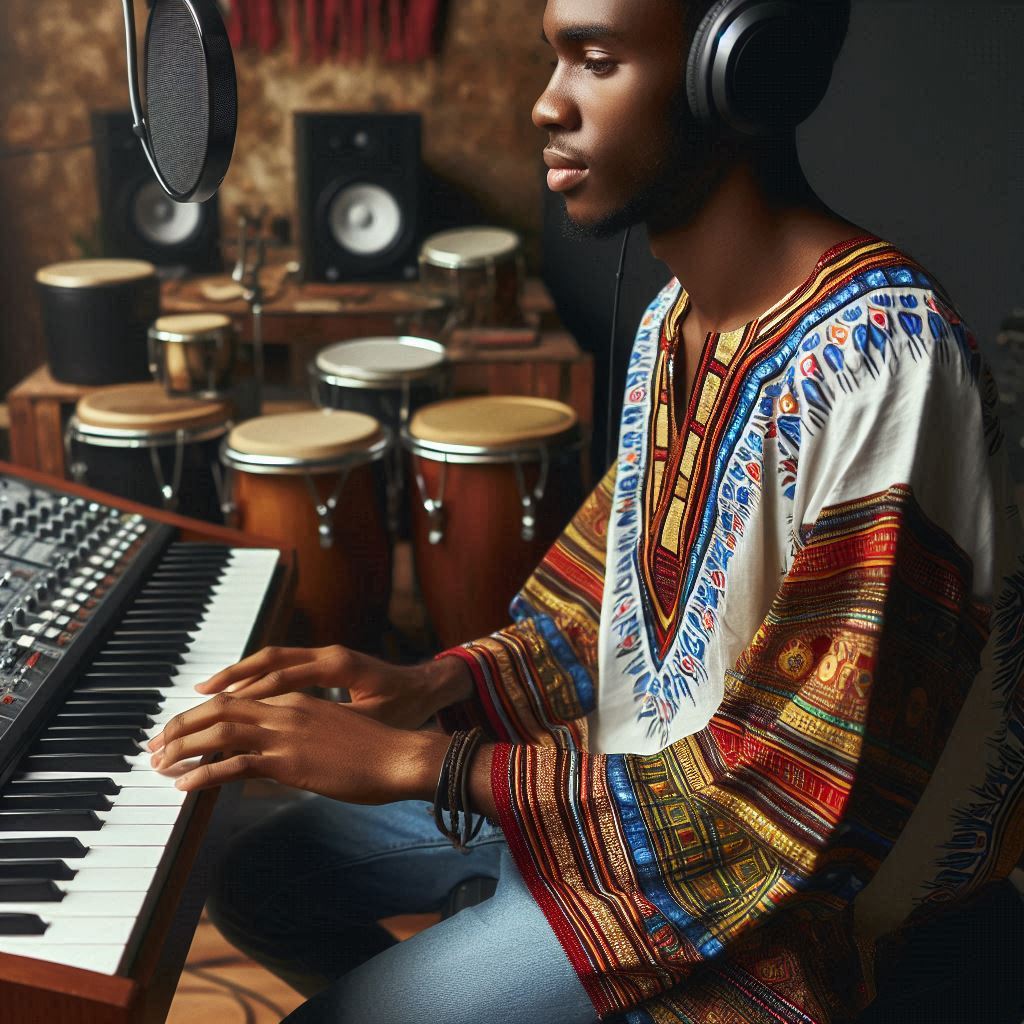Introduction
Extracurricular activities are indispensable components of the educational experience in Nigerian music schools.
These activities, which encompass a diverse range of musical pursuits outside of the formal curriculum, play a pivotal role in shaping the musical journey of students.
Defining Extracurricular Activities in Music Education
Extracurricular activities, in the context of music schools, refer to any musical endeavors undertaken by students outside of their regular academic coursework.
These activities extend beyond the confines of the traditional classroom setting and provide students with valuable opportunities for practical application and creative expression.
Definition of Extracurricular Activities
In Nigerian music schools, extracurricular activities encompass a broad spectrum of musical engagements.
This includes participation in school bands, choirs, orchestras, music clubs, workshops, masterclasses, and performances.
These activities serve as avenues for students to explore diverse musical genres, develop technical skills, and collaborate with peers in a supportive environment.
The Importance of Extracurricular Activities in Music Education
Extracurricular activities are integral to a comprehensive music education for several reasons.
Firstly, they offer students practical, hands-on experiences that reinforce theoretical learning.
Through participation in ensemble rehearsals, students apply concepts learned in class, such as music theory, sight-reading, and ensemble techniques, in a real-world context.
Moreover, extracurricular activities facilitate artistic exploration and creativity.
In music clubs or composition workshops, students have the freedom to experiment with different musical styles, instrumentation, and songwriting techniques.
These experiences encourage students to develop their unique musical voices and expand their creative horizons.
Additionally, extracurricular activities promote social interaction and teamwork among students.
Ensemble rehearsals and performances require collaboration, communication, and mutual respect among members to achieve a cohesive and harmonious outcome.
Students learn valuable interpersonal skills, such as leadership, cooperation, and conflict resolution, which are essential for success both in music and in life.
Furthermore, participation in extracurricular activities contributes to the holistic development of students.
By engaging in music-related pursuits outside of the classroom, students cultivate discipline, time management, and perseverance—qualities that are transferable to various aspects of their lives.
These activities also foster a sense of belonging and pride in the school community, enhancing students’ overall educational experience.
In Nigerian music schools, extracurricular activities serve as platforms for students to showcase their talents, nurture their passion for music, and prepare for future professional endeavors.
Whether through performances, competitions, or community outreach initiatives, students benefit immensely from the diverse range of extracurricular opportunities available to them.
Basically, extracurricular activities are essential components of music education in Nigerian schools, providing students with invaluable experiences that complement and enrich their formal learning.
By fostering creativity, collaboration, and personal growth, these activities empower students to become well-rounded musicians and contributing members of society.
Overview of extracurricular activities offered in Nigerian music schools
Different types of extracurricular activities are available
Extracurricular activities in Nigerian music schools encompass a wide range of options to cater to students’ diverse interests and talents.
These activities are designed to complement the academic curriculum and provide students with opportunities for personal growth and development.
Some of the different types of extracurricular activities available in Nigerian music schools include:
- Choir
- Music production
- Instrumental ensembles
- Music theory classes
- Dance classes
- Music competitions
Examples of popular extracurricular activities in music schools
Several extracurricular activities are popular among students in Nigerian music schools.
These activities not only enhance students’ musical skills but also foster teamwork, creativity, and self-expression.
Some of the most popular extracurricular activities in Nigerian music schools include:
- Choir: Students participate in regular choir rehearsals and performances, honing their vocal skills and harmonizing with their peers.
- Music production: Students learn the ins and outs of music production, including recording, mixing, and mastering tracks in a professional studio setting.
- Instrumental ensembles: Students collaborate with their peers to form instrumental ensembles, such as string quartets or jazz bands, and perform at school events and concerts.
- Music theory classes: Students delve into the theoretical aspects of music, learning about notation, scales, chords, and composition under the guidance of experienced music instructors.
- Dance classes: Students can explore their creativity through dance classes, where they learn different dance styles and techniques to express themselves through movement and rhythm.
- Music competitions: Students have the opportunity to showcase their musical talent and compete against their peers in regional and national music competitions, gaining valuable performance experience and recognition.
Read: Sociology Departments in Nigerian Universities
Benefits of participating in extracurricular activities in Nigerian music schools
Development of Musical Skills and Talents
Participating in extracurricular activities in Nigerian music schools provides students with the opportunity to develop and enhance their musical skills.
Through regular practice and performance, students can progress in their abilities and refine their talents.
Engaging in activities such as choir, band, or orchestra allows students to learn new techniques, improve their instrumental skills, and expand their musical knowledge.
They can receive valuable feedback from instructors and peers, which helps them identify areas for growth and improvement.
Moreover, participating in music competitions and concerts enables students to showcase their talents and receive recognition for their hard work.
These experiences not only boost their confidence but also motivate them to continue honing their skills.
Opportunities for Networking and Collaboration with Other Musicians
Extracurricular activities in Nigerian music schools offer students the chance to connect with other musicians and build relationships within the music community.
By collaborating with peers who share similar interests, students can learn from each other, exchange ideas, and create music together.
Through group rehearsals and performances, students develop teamwork skills, communication abilities, and leadership qualities.
They learn how to work cohesively with others towards a common goal, which is essential for success in the music industry.
Furthermore, participating in music workshops, masterclasses, and festivals allows students to interact with established musicians, industry professionals, and music enthusiasts.
These networking opportunities can open doors to potential collaborations, mentorships, and career prospects in the music field.
Enhancement of Creativity and Self-Expression
Engaging in extracurricular activities in Nigerian music schools nurtures creativity and self-expression in students.
By exploring different genres, styles, and techniques, students can experiment with their musical ideas and develop their unique artistic voice.
Participating in composition projects, songwriting sessions, and improvisation exercises encourages students to think outside the box, take risks, and express themselves authentically through music.
They learn to channel their emotions, thoughts, and experiences into their musical creations, which fosters personal growth and self-discovery.
Additionally, engaging in performance opportunities allows students to express themselves confidently on stage, connect with audiences on a deeper level, and convey meaningful messages through their music.
This process empowers students to share their stories, perspectives, and emotions with the world, making a positive impact through their artistry.
Essentially, participating in extracurricular activities in Nigerian music schools offers numerous benefits, including the development of musical skills and talents, opportunities for networking and collaboration with other musicians, and enhancement of creativity and self-expression.
Students who engage in these activities not only improve their musical abilities but also cultivate valuable life skills and experiences that will benefit them in their musical journeys and beyond.
Read: Integration of Cultural Studies in Nigerian Curriculum
Challenges Faced by Students in Participating in Extracurricular Activities in Nigerian Music Schools
Students in Nigerian music schools face various challenges when it comes to participating in extracurricular activities.
These challenges can hinder their overall experience and development in the music school setting.
Time Constraints Due to Academic Workload
One of the biggest challenges faced by students is the time constraints imposed by their academic workload.
Music students often have a rigorous schedule that includes classes, rehearsals, and practice sessions, leaving little time for extracurricular activities.
With the demanding nature of their coursework, students may find it difficult to balance their academic responsibilities with participation in extracurricular activities such as music clubs, ensembles, or performances.
This can lead to burnout and fatigue, affecting their overall well-being and performance.
Financial Constraints in Accessing Extracurricular Activities
Another significant challenge faced by students is the financial constraints in accessing extracurricular activities.
Participation in music clubs, workshops, or competitions may require additional fees or expenses that some students may not be able to afford.
Music schools in Nigeria often lack adequate funding or support for extracurricular activities, making it difficult for students from low-income backgrounds to fully engage in these opportunities.
This can result in students missing out on valuable experiences and networking opportunities that could enhance their musical education.
Limited Resources and Facilities for Extracurricular Activities
Moreover, students in Nigerian music schools may face challenges related to limited resources and facilities for extracurricular activities.
Music schools may not have enough practice rooms, equipment, or performance spaces to accommodate all students’ needs.
Students may struggle to find suitable spaces for rehearsals or lack access to proper instruments or technology for their extracurricular projects.
This limitation can hinder their creative expression and growth as musicians, impacting their ability to fully benefit from extracurricular activities.
Generally, students in Nigerian music schools encounter various challenges in participating in extracurricular activities.
From time constraints to financial limitations and resource shortages, these obstacles can impede students’ holistic development and hinder their overall musical experience.
Read: The Role of Sociology in Nigerian Social Policy

Strategies for promoting and supporting extracurricular activities in Nigerian music schools
When it comes to promoting and supporting extracurricular activities in Nigerian music schools, there are several strategies that can be implemented to enhance the overall experience for students. Here are some key methods:
Collaboration with music industry professionals for mentorship programs
- Invite successful musicians, producers, and other industry experts to mentor students.
- Organize workshops, masterclasses, and networking events with professionals in the music industry.
- Create opportunities for students to gain real-world experience through internships and job shadowing.
Fundraising initiatives to support extracurricular activities
- Host benefit concerts, music festivals, or charity events to raise funds for extracurricular programs.
- Seek sponsorship from local businesses, music companies, or philanthropic organizations.
- Encourage alumni, parents, and community members to donate towards supporting student activities.
Integration of extracurricular activities into the school curriculum
- Designate specific class periods or elective courses for extracurricular music programs.
- Ensure that extracurricular activities align with educational objectives and learning outcomes.
- Provide academic credit or recognition for participation in extracurricular music activities.
By implementing these strategies, Nigerian music schools can create a supportive and enriching environment for students to explore their musical interests and talents beyond the classroom.
Collaboration with industry professionals, fundraising efforts, and curriculum integration all play vital roles in the success of extracurricular activities in music education.
Read: Career Opportunities for Sociology Graduates in Nigeria
Success stories of students who have excelled through participation in extracurricular activities in Nigerian music schools
Extracurricular activities in Nigerian music schools have profoundly influenced the careers of successful musicians. Personal anecdotes and testimonials attest to the transformative power of these experiences.
Personal Anecdotes and Testimonials from Successful Musicians
Asa
Asa, a graduate of Peter King’s School of Music, recalls the pivotal role extracurricular activities played in her musical journey.
Participating in school performances and ensemble rehearsals honed her performance skills and fostered a deep appreciation for collaboration.
Yemi Alade
Yemi Alade, who studied music at the University of Lagos, credits extracurricular activities for shaping her artistic identity.
Engaging in music clubs and workshops allowed her to explore different musical genres and develop her unique sound.
Cobhams Asuquo
Cobhams Asuquo, a renowned music producer and singer, reflects on the impact of extracurricular activities on his career.
His participation in school bands and music clubs provided him with invaluable opportunities to refine his production skills and collaborate with fellow musicians.
Simi
Simi, who studied mass communication at Covenant University while pursuing her passion for music, emphasizes the significance of extracurricular activities in her musical journey.
Engaging in school performances and music festivals helped her build confidence as a performer and connect with a broader audience.
Adekunle Gold
Adekunle Gold, an alumnus of Lagos State Polytechnic, shares how extracurricular activities enriched his musical education.
Participation in music workshops and competitions exposed him to new musical styles and techniques, shaping his versatile approach to music production.
Tiwa Savage
Tiwa Savage, a graduate of Berklee College of Music, highlights the transformative impact of extracurricular activities on her career.
Engaging in ensemble rehearsals and collaborative projects fueled her passion for music and provided her with essential networking opportunities.
Impact of Extracurricular Activities on Their Musical Careers
These personal anecdotes and testimonials underscore the profound impact of extracurricular activities on the musical careers of successful Nigerian musicians.
Participation in school bands, music clubs, workshops, and performances not only honed their technical skills but also fostered creativity, collaboration, and personal growth.
Extracurricular activities provided aspiring musicians with invaluable opportunities to experiment with different musical styles, collaborate with peers, and showcase their talents to a broader audience.
These experiences helped them develop their unique artistic identities and paved the way for future success in the music industry.
Transform Your Career with Expert Guidance
Get personalized mentorship consulting that’s tailored to your unique path. Our expert advice is actionable and exclusive.
Get StartedMoreover, engagement in extracurricular activities instilled essential life skills such as discipline, time management, and teamwork, which are invaluable for navigating the complexities of the music industry.
By immersing themselves in diverse musical experiences, these musicians were able to broaden their musical horizons, expand their networks, and position themselves for success in their respective careers.
Therefore, extracurricular activities play a vital role in shaping the musical careers of aspiring musicians in Nigerian music schools.
By providing students with hands-on experiences, creative outlets, and networking opportunities, these activities empower them to realize their full potential and make meaningful contributions to the vibrant Nigerian music scene.
Conclusion
In summary, extracurricular activities play a pivotal role in the musical education landscape of Nigerian schools.
Throughout this blog post, we’ve explored the multifaceted benefits of engaging in such activities, including skill enhancement, collaboration opportunities, and personal growth.
By actively participating in extracurricular activities, students not only refine their musical talents but also cultivate essential life skills such as teamwork, discipline, and time management.
These activities serve as catalysts for holistic development, nurturing not just musicians but well-rounded individuals poised for success in various facets of life.
Therefore, I urge students to seize every opportunity to immerse themselves in the rich tapestry of extracurricular offerings available in Nigerian music schools.
Embrace the chance to join ensembles, attend workshops, and participate in performances.
By doing so, you’ll not only enrich your musical journey but also lay the groundwork for a bright and fulfilling future.




